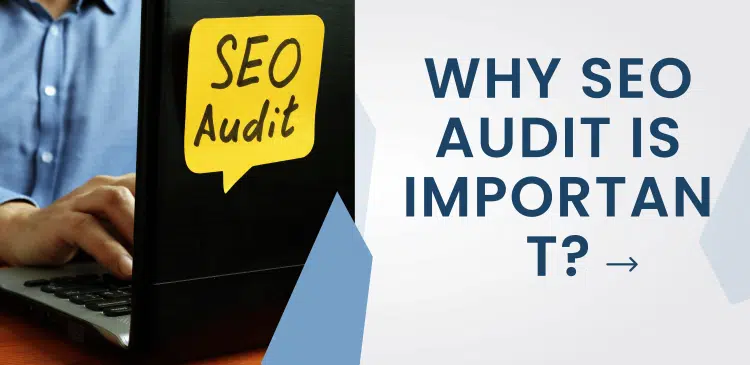Why SEO Audit Is Important?

In this era of technology, search engine optimization is very important for businesses and websites. It makes sure that a website can be seen by search engines thus enhancing the possibility of ranking higher in search results. This more exposure may get more clicks which could then lead to better sales conversions and increased revenue. Nevertheless, optimizing a site isn’t something done once; you must do it continuously through monitoring and enhancing. That’s why there’s need for an SEO audit.
An SEO audit is a detailed assessment of how well a website performs against SEO best practices. It examines different parts of the site to discover areas that could be holding it back from ranking high on SERPs. An effective SEO strategy is never complete without conducting an SEO audit as it gives actionable recommendations for optimizing online visibility and meeting marketing objectives.
Benefits of Conducting an SEO Audit
Identifying Technical Issues
The ability to identify technical problems that might be affecting the performance of a website is one of the main advantages of conducting an SEO audit. These could be anything from broken links and slow page loading times to mobile usability issues or security vulnerabilities. It is necessary to find out about such issues and fix them as soon as possible since they can greatly hinder search engine crawlability and indexing of a site. Furthermore, user experience may suffer due to technical difficulties which result in higher bounce rates and lower engagement levels.
Improving Website Visibility
Conducting an SEO audit may also enhance the website visibility on search engine result pages. A comprehensive SEO audit of your website highlight weak areas in the site by investigating things such as keyword usage, content optimization, and backlink profile. Such an audit may show that some pages are not optimized for relevant keywords or that there are no good quality links coming into the website.
Increasing Organic Traffic
Organic traffic refers to users who find a website through search engine results rather than paid advertisements, and a well-optimized site is more likely to attract this kind of traffic. By evaluating the content, meta tags, and structure of a site, an SEO audit can identify opportunities for improvement that will make it more appealing to both search engines and visitors.
Enhancing User Experience
Search engine optimization (SEO) is closely linked to user experience (UX), and evaluating different UX factors using an SEO audit helps in ensuring they are well optimized for users as well as search engines. This involves reviewing site navigation, readability, and accessibility. Good user experiences result into higher engagement rates, longer visit duration times and better conversion rates; therefore, any improvements made based on SEO audits will directly affect the overall performance of a site in terms of its visibility on search engine results pages (SERPs).
Optimizing Online Presence and Achieving Marketing Goals
Optimization of businesses’ online presence on search engines and social media platforms is the main purpose of an SEO audit. Digital marketing strategies can be improved through the information acquired from it thereby making sure they reach their intended audience. When a business takes care of the issues that have been pointed out during audit, they will be able to accomplish various marketing goals like creating brand visibility, driving leads as well as increasing sales volume.
Key Elements of an SEO Audit
Technical Website Analysis
- Site Structure: To have a good user experience and make it easier for search engines to crawl, the website should be properly arranged in terms of pages and hierarchy. The SEO audit measures the coherence of site structure by checking that navigation is easy and whether or not crucial pages are within reach for users as well as search engines.
- Crawling and Indexing: Search engines deploy spiders to crawl and index websites. Anything that hinders this process can affect rankings negatively. An SEO audit will look into things such as wrongly set up robots.txt files, absence or wrong XML sitemaps, and the existence of noindex tags which could stop key pages from getting indexed.
- Mobile Friendliness: As the use of mobile devices continues to rise, it is crucial for a website to be compatible with such devices. An SEO audit evaluates how well a site performs on mobile phones vis-à-vis responsive design, speed of mobile pages, and general user experience. Search engines prioritize mobile-friendliness in their ranking algorithms; therefore, this should form part of any audit carried out by an optimizer.
Content Optimization
- Keyword Research: Keywords are very important for SEO success. Relevance and competitiveness of targeted keywords should be checked by an SEO audit which also shows where improvements can be made; it also identifies new keyword opportunities that reflect what users want.
- Content Quality: Quality content is important for user engagement and SEO. An SEO audit measures the relevance, originality, and worth of a website’s content by making sure it satisfies user intent and follows SEO guidelines. This might mean finding duplicate or thin pages or pointing out outdated information that should be updated.
- Meta Tags and Headers: Meta tags including title tags and meta descriptions, are essential for search engine optimization (SEO). An SEO audit checks these things out to make sure that they have been optimized with the right keywords and providing a reason for a user to click through from the SERPs. It also looks at header tags (H1s, H2s etc.) to see if they have been used correctly and contribute towards shaping up content as whole.
Off-Page Optimization
- Backlink Profile: SEO is heavily dependent on backlinks or inbound links from other websites. An SEO audit examines the backlink profile of a website to determine how many there are and their quality. This means checking for toxic or spammy links which can affect rankings as well as finding places where good, relevant backlinks could be built to improve SEO performance.
- Social Media Presence: Social signals are not a direct ranking factor, but they can help with overall SEO efforts. An SEO audit looks at the website’s social media engagement and its effect on SEO, such as how social media is bringing traffic to the site and increasing brand visibility.
User Experience and Accessibility
- Page Speed: Slow load times can make for a bad user experience and affect SEO. An SEO audit examines how fast web pages load on desktops and mobile devices while also singling out areas where speed and performance may be improved.
- Navigation and Usability: To keep users engaged, it is important that the website is easy to navigate and has good usability. That’s why an SEO audit assesses these factors: to make sure people can find what they’re looking for without any trouble and that the site is user-friendly.
- Accessibility Compliance: Making a website accessible to all users, regardless of disabilities, is important not only for inclusivity but also for SEO. An SEO audit looks at whether or not the site is accessible enough and meets standards like WCAG (Web Content Accessibility Guidelines).
Implementing Audit Findings
Effective Implementation of SEO Audit Recommendations
After finishing an SEO audit, the next thing to do is to come up with a strategic action plan that will be based on the results. This plan should identify key problems to be worked on first because they have the greatest effect on search engine optimization performance. For instance, fixing technical issues which hinder site crawling and indexing by search engines should take precedence.
Prioritizing and Addressing Identified Issues
The performance will not be affected equally by the problems identified during an SEO audit. In order to enhance rankings and traffic, businesses must classify their tasks as technical fixes, content updates or off-page enhancements, and prioritize them accordingly. For example, it might be more important to repair broken links and optimize meta tags than getting new backlinks.
Continuous Monitoring and Adjustment
Search engine optimization is a continuous process, therefore regular check-ups are necessary to sustain and enhance its performance. Once the modifications have been made based on the recommendations from the SEO audit, businesses need to keep track of important SEO indicators such as position in search results, organic visits or conversion rate. Conducting SEO audit on a regular basis may help to maintain optimization of the website after any algorithmic or market changes have been applied.
Conclusion
An SEO audit is necessary in order to monitor and improve the ranking of a website indexed by search engines. It aids in helping businesses notice technical problems and enable them to optimize content for users; this leads to higher organic traffic and visibility. SEO audits are not a one-time exercise but an ongoing process that is integrated into an SEO campaign for the continuous online success. Through constant assessment and enhancement of their online presences, businesses are able to remain current and effective within this dynamic context of the internet marketing environment thus enable the achievement of set promotional objectives and the maximisation of ROI.




 Bill Yeager, Co-Owner of High Point SEO & Marketing in CT
Bill Yeager, Co-Owner of High Point SEO & Marketing in CT